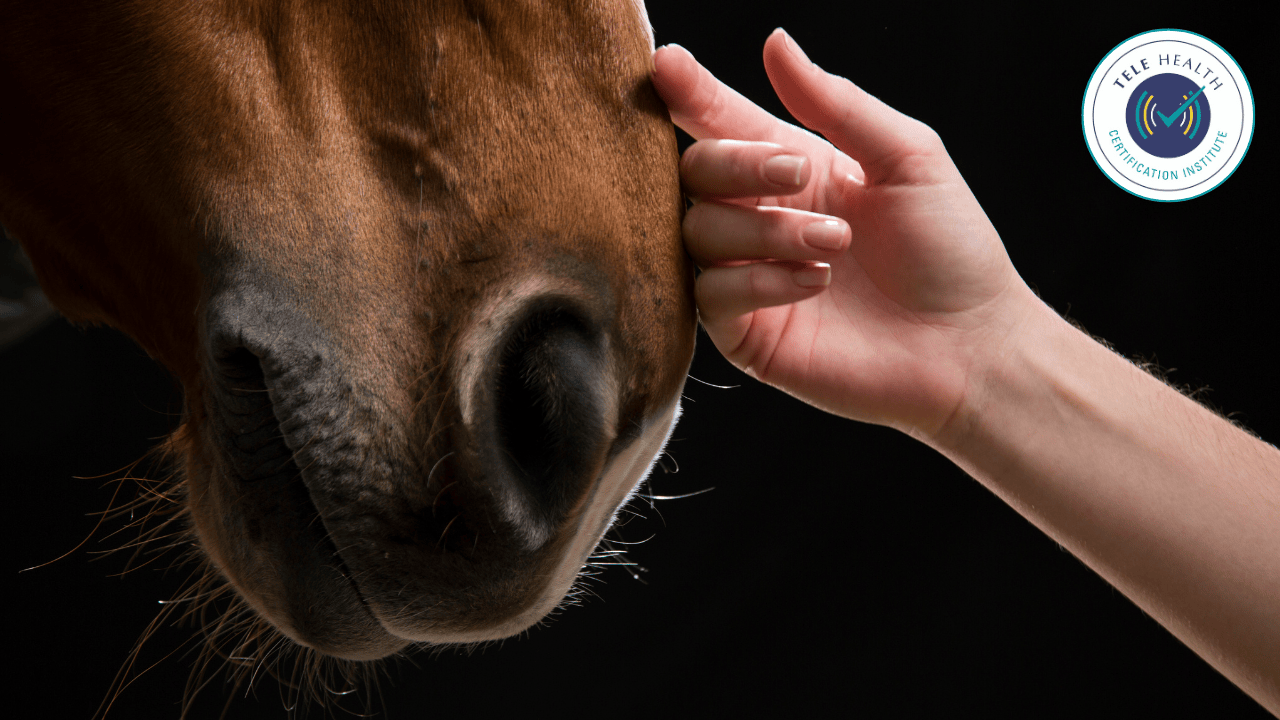Introduction to Equine Facilitated Psychotherapy
Enroll in the Online Self-Study course and complete it at your own pace.
2 CE hours available for behavioral health clinicians upon completion.

Horses don’t lie—and that’s exactly why they make such powerful therapeutic partners. Their instincts, honesty, and responsiveness can help clients uncover emotional truths, establish healthy boundaries, and rebuild trust where words fall short.
Equine Facilitated Psychotherapy (EFP) opens a unique doorway for healing, one that integrates movement, mindfulness, and connection in a natural setting. This course offers a grounding introduction to the clinical application of equine partnerships in mental health care.
Enroll in the 2 CE Online Self-Study for $100
Payment Options are listed at checkout
Dr. Christina Strayer, Ed.D., LCMHCS, is a nationally recognized expert in Animal Assisted Therapy. With decades of clinical experience and a rich history of teaching, research, and direct work with animals—including equines—she equips clinicians with the knowledge and perspective needed to ethically and effectively incorporate horses into therapy sessions.
Dr. Strayer brings a holistic, integrative approach rooted in client-centered care, blending her expertise in trauma treatment, animal behavior, and experiential learning. Her instruction emphasizes safety, collaboration, and ethical practice—anchored in evidence and guided by compassion.
Participants will explore the origins of Equine Facilitated Psychotherapy, core terminology, and clinical distinctions between EFP, Therapeutic Riding, and Hippotherapy. You'll learn how to assess the suitability of horses for therapy, navigate common safety concerns, define the role of both the mental health professional and equine specialist, and apply EFP models within a treatment framework. The course also highlights key populations who benefit most from EFP and reviews emerging research on outcomes in trauma, addiction, autism, and more.

Instructor
Dr. Christina Strayer, Ed.D, LCMHCS, AAT-I, THTC, CYT-200, NLC-P, is a Licensed Clinical Mental Health Counselor and Supervisor, Licensed Clinical Addictions Specialist-Associate, Pet Partner Team Evaluator, Animal Assisted Therapist-Interventionist, and Life Coach with her coaching practice Energy Coaching with Horses and Others (E.C.H.O.) in North Carolina. Her private practice is Animal Assisted Therapy of the Triangle. She is trained in a variety of Integrative Therapies including Art, Yoga, and Mindfulness. Her theoretical approach is Client-centered and Holistic. Along with her mini goats, avian, equine, canine, and crustacean helpers, Christina combines her study of the power of the Human and Animal Bond in healing with proven counseling theories and techniques to guide clients in reaching their goals.
She has a diverse background in counseling and teaching. She is the Lead Instructor for the Animal Assisted Therapy Interventionist (AAT-I) certification course. She has served as an adjunct professor at Campbell University in the Counselor Education department. She has traveled and conducted AAT seminars for PESI, a national continuing education organization, and conducts Seminars/Workshops/Groups locally on a variety of Mental Health/Wellness topics. She primarily works in the areas of PTSD, Panic Disorder, Crisis Intervention, Compassion Fatigue, Stress, Trauma, Grief and Loss, Anxiety, Addictions, Depression, Goal setting, Consultation, Self-Esteem, Conflict Resolution, Social Skills, Team Building, and Life Balance/Transitions.
Key Takeaways:
Differentiate therapeutic models: Understand the evolution and distinctions between EFP, Therapeutic Riding, and Hippotherapy.
Clarify professional roles in EFP: Learn how clinicians and equine specialists collaborate safely and ethically with horses and clients.
Apply evidence and practice: Gain insight into equine behavior, safety concerns, and the therapeutic benefits of EFP for various populations.
Why This Course?
Expert-led, clinically grounded: Learn from one of the field’s most respected animal-assisted therapy instructors with real-world experience and academic depth.
Built for ethical, confident practice: Gain practical knowledge that supports safe and informed decisions about integrating EFP into your scope of care.
Offered by a trusted CE provider: Telehealth Certification Institute is committed to empowering clinicians through high-quality, accessible, and ethically sound education.
Learning Objectives:
Describe the evolution of EFP and the difference between EFP, Therapeutic Riding, and Hippotherapy.
Define the roles of the mental health professional and the equine specialist in EFP, and differentiate models of interaction between the horse, client, mental health professional, and the equine specialist in EFP.
List important elements within EFP of horse behavior, reasons horses may of may not be suitable, and specific benefits to populations shown to benefit from EFP.
As you explore the therapeutic potential of equine partnerships, this course offers the foundation to move forward with confidence, clarity, and care. Your next steps in EFP practice begin here.
Add to cart to begin learning instantly.
This is a non-interactive, self-study course. It consists of 80+ minutes of video instruction, reading assignments and written responses, a post-test and an evaluation.
This course is Course 4 (of 8) of the AAT-I Credential Program and can be taken individually or as part of the full program.
Please Note: Textbooks are required to complete AAT-I learning content. Reading material is not included with course enrollment and must be purchased separately from retail booksellers. (See "Requirements" tab for specifics.)
Select each tab for course details
Availability: From the time of registration, you have six months to access the coursework.
Who Should Attend: This course is intended for clinicians who provide behavioral health services.
Teaching Methods: This is a non-interactive, self-study course. Teaching methods for this course include recorded lectures, videos, a post-test, and a course evaluation.
How to attend: Directions for completing a course can be found by clicking here.
This program was recorded on September 20, 2023.
Testimonials
Bridgette Nalumu
Public health consultant, Green and Purple Consultancy Network
Lora Verley
Clinical Therapist, Bayless Integrated Healthcare
Jackie Tanna
Therapist, Region One Mental Health
Jackie Bell-Russell
Therapeutic Behavioral Strategist, Rialto Unified School District